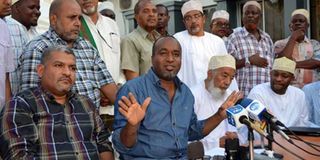Four Mombasa mosques closed by police to re-open

Muslim leaders led by Mombasa Governor Ali Hassan Joho during a press conference in Mombasa on November 26, 2014 after they resolved that four mosques closed by police last week after being taken over by radical youths would be re-opened Thursday. PHOTO | KEVIN ODIT | NATION MEDIA GROUP
What you need to know:
- The decision to re-open Minaa, Sakina, Musa and Swafaa mosques came after two days of talks.
- Before the mosques can be re-opened, however, Muslim leaders and professionals will have to appoint a permanent Sheikh for each mosque.
- Muslim leaders in Mombasa and other parts of the country have been calling for the re-opening of the mosques.
- At a news conference Wednesday evening, Mr Joho said the mosques will be handed over to community elders from the respective areas.
The four mosques closed by police in Mombasa last week after being taken over by radical youths are expected to be re-opened Thursday.
The Nation has learnt that the decision to re-open Minaa, Sakina, Musa and Swafaa mosques came after two days of talks between top Muslim leaders, professionals and the Mombasa County leadership.
Details of the talks hosted by Governor Hassan Joho and County Commissioner Nelson Marwa have been kept under lock and key.
Before the mosques can be re-opened, however, Muslim leaders and professionals will have to appoint a permanent Sheikh for each mosque and name a special committee to preside over the mosques in Kisauni and Majengo.
“We don’t want them to feel that the government is undermining them.
"We have given them time to talk and decide on the mosques committees and the Sheikh who will be conducting prayers.
"They will give us names and by tomorrow the mosques will be opened,” said Mr Marwa who also chairs the county security committee.
LEADERS INVITED
Sources said that among those who were invited to the talks were top Islamic leaders, including representatives from the Supreme Council of Kenya Muslims (Supkem), the Kenya National Muslim Advisory Council and the Council of Imams and Preachers of Kenya.
The mosques were closed last week by security officers after a raid on the Musa Mosque and a swoop in which more than 250 people were rounded up and later charged with being members of a terrorist organisation.
Last Monday, police also displayed various weapons and literature which they said was found in the mosques.
Hours after the arrests, gangs of youth went on the rampage, attacking innocent people at three bus-stops and in some estates in Kisauni Sub-County.
During the violence, three people were stabbed to death while at least seven others were seriously wounded.
Wednesday, 13 people who were charged last week with being in possession of hand-grenades at Masjid Musa and Sakina were taken tocourt and police were given one week to complete their investigations.
RADICALISATION CLAIMS
Muslim leaders in Mombasa and other parts of the country have been calling for the re-opening of the mosques which have been at the centre of controversy over claims that they were being used to radicalise youths and store illegal weapons.
Some of the leaders who attended the two-day talks had suggested that the management of the mosques should revert to the committees that were running them before the police raids.
Governor Joho, Senator Hassan Omar, Woman Representative Mishi Mboko, MPs Rashid Bedzimba (Kisauni), Badi Twalib (Jomvu), Omar Mwinyi (Changamwe) and Abdulswamad Nassir (Mvita) were among those who suggested that the mosques be handed over to the committees but with the rider that the government continues to monitor their activities.
Wednesday, Mr Marwa said leaders in the county were working together in search for peace and harmony in Mombasa.
“Our core mandate is serving the people and ensuring and maintaining their security. Together with the governor, we will attain it,” he said.
RE-OPEN UNCONDITIONALLY
On Sunday, the county’s leaders including Mr Joho held consultations with the Haki Afrika, a human rights organisation, and agreed that the government would re-open the mosques unconditionally and that a task-force of nine would be picked to run the four mosques and address the question of youth radicalisation which has been blamed for a spate of attacks that have hit the tourist town.
During the meeting that brought together over 120 leaders at the Royal Castle Hotel in Mombasa, participants unanimously agreed that all the people arrested after the police raids on the mosques would be released after screening.
At a news conference Wednesday evening, Mr Joho said the mosques will be handed over to community elders from the respective areas.
“We are only facilitators. Residents of those particular areas will manage the mosques. Later, perhaps with structured programmes, committees will be formed,” Mr Joho said.
He urged the youth to be disciplined and respect places of worship.





